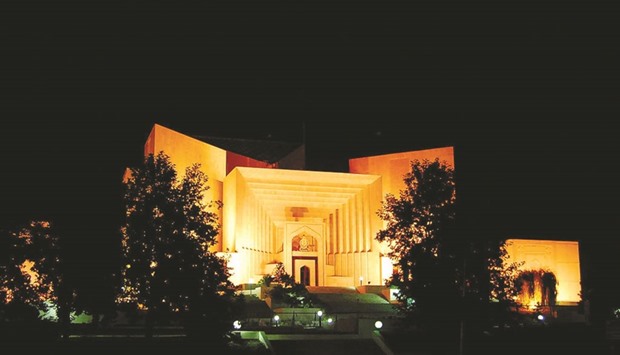Few had thought it possible that the ‘umpire’ Imran Khan, chairman of the opposition Pakistan Tehrik-i-Insaf (PTI), is ever so fond of invoking every time he takes to the street, would turn out to be from that grand building on Islamabad’s Constitution Avenue, not some knight in shining armour from twin city Rawalpindi.
But that is exactly what has happened, and all of Pakistan is relieved, for, until the Supreme Court ‘intervened’ just one day ahead of the PTI’s avowed ‘lockdown’ of the federal capital, many pundits had been forecasting doom with the apprehension that the country may even be headed back to Square One with the marching of boots.
These apprehensions, one might add, were not entirely without basis even after the ruling Pakistan Muslim League-Nawaz (PML-N) had managed to quell much of the heat with strong-arm tactics, resulting in the severe shelling of a protest march led by Pervez Khattak, chief minister of the PTI-ruled Khyber-Pakhtunkhwa province, towards the capital; cutting off the road link to – and besieging – Imran Khan’s residence atop the Bani Gala hills in Islamabad; and containment elsewhere.
The PML-N, many observers felt, had good reason to take the bull by the horns this time as opposed to the almost lackadaisical approach to the first PTI agitation in 2014 when Khan led a 126-day protest campaign outside the national parliament over allegations that the PML-N had conspired to rig the elections the year before, and which, he charged deprived his party of a fair shot at winning power.
With Khan vowing to go bust for his demand to hold Prime Minister Nawaz Sharif accountable after the names of his children appeared in the Panama Papers purporting them to be the beneficiaries of unaccounted offshore wealth, and a damning published leak of a security meeting that suggested Sharif had taken umbrage at the military in relation to Islamabad’s alleged isolation, the PML-N was taking no chances with where their nemesis Khan was headed in Circa ’16.
The ruling party has also been treading cautiously with the impending retirement of Army Chief General Raheel Sharif later this month with speculation rife about the possibility or otherwise of an extension.
With no names being sounded out for succession by either Sharif – the PM or the General – unease was apparent in how the PML-N quickly swung into action in terms of both decibel and deed to stop the PTI in its tracks.
Ironically, Khan, for all his brouhaha, failed to muster even the numbers that would have given him some political succour, let alone press home the advantage that he had fervently given Pakistan’s rating-driven electronic media to believe was his for the taking.
In the lead-up to the shrill November 2 ‘lockdown’, the PTI chairman had bragged that a million march would force either the PM to resign or turn himself in for accountability.
But Khan did not venture out of his Bani Gala residence, even when his party workers were being manhandled or teargassed.
The PTI chairman has been defending the inaction, saying staying put at his residence until the appointed day was always the plan because he is not “stupid” to have gotten himself arrested before then.
This has not cut ice with the legion of his followers who had anticipated the proverbial long night to win the day.
But Khan’s decision to abruptly call off the ‘lockdown’ once the Supreme Court set up pace for a probe into Panamagate wasn’t necessarily prompted by just “getting what the PTI had long wanted” as he has been understandably, driving home since then.
The fact is that the PTI chairman was thoroughly disappointed by the thin numbers who hit the road and cognizant of a major embarrassment on ‘action’ day, compelled him to live to fight another day.
However, given the breathless pace and in-your-face mien of Pakistan’s vibrant electronic media, it was never going to escape their roving eye.
In fact, some of the TV channels which were preparing for the juggernaut to roll gave away their bitter disappointment at being ‘shortchanged’ by turning their ire on Khan for being ‘heartless’ in getting his workers beaten up whilst himself staying cozied in his sprawling residence!
That being said, it would probably be unfair not to give the man some credit – where the entire combined opposition failed miserably – for relentlessly pursuing a case which has forced the apex court to now take a frontal position on after it had rejected precisely such a call more than half a year ago when it first surfaced.
The Supreme Court had back then eschewed the idea because it felt all the parties concerned should have a consensus on terms of reference (ToRs) for it to be viable.
It proved beyond the government and opposition, which were predictably, drawn into a bitter battle of attrition over the framework.
The opposition wanted to start the probe with the PM and his family whilst the government contested this, saying the PM himself was not named in the Panama Papers and wanted to expand the scope to question all the others with offshore wealth by even going back in time – an idea the opposition suspected was a deliberate time-consuming ploy to ensure the probe never reached a conclusion.
However, the apex court’s decision to now take it upon itself to pave the way for an inquiry is both timely and admirable given how much of a dogfight it had become for the power stakeholders, and which, would have potentially, pushed the country to the edge of precipice.
On the first day of the hearing, the court ordered the parties to reach a consensus on the ToRs, failing which it would itself determine it – almost certain to be the case given the daylight chasm between the PML-N and PTI.
Today’s hearing will be a decent indicator of how much meat there is in the case as the drama in national life moves ever so delicately to some sort of conclusion down the road, which naysayers until now had been betting would produce zilch.
* The writer is Community Editor.

Centre-stage: The brightly lit Supreme Court of Pakistan building on Islamabad’s famed Constitution Avenue.

